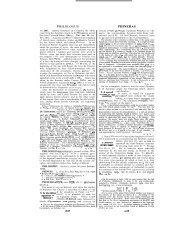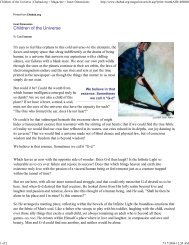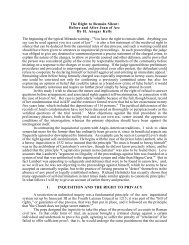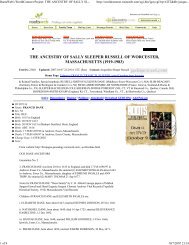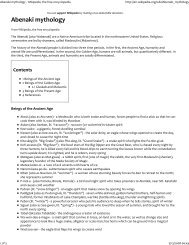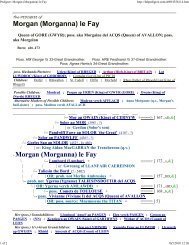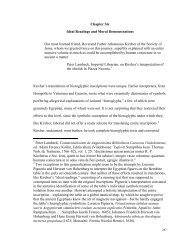sefi;g:v. - A Kabbalist walks into a bar, and the
sefi;g:v. - A Kabbalist walks into a bar, and the
sefi;g:v. - A Kabbalist walks into a bar, and the
Create successful ePaper yourself
Turn your PDF publications into a flip-book with our unique Google optimized e-Paper software.
SELED<br />
possible indeed that GL~$. only exists through textual corrup.<br />
tion. Sc~i+dpa <strong>and</strong> ivi+Apa have been suggested (a#.<br />
Schultens, Lex. in LXX [782o] 1146), but nei<strong>the</strong>r word exists.<br />
It remained to suggest that 6ri+. may be a Grsxised Hebrew<br />
word ; (see above) might become first Gaodpa <strong>and</strong> <strong>the</strong>n,<br />
for euphony, Gri$dpa. T. K. C.<br />
SELED (15D ; aAc. cahah, [BI, c. [AI, -EA [LI),<br />
b. Nadab b. Shammai, a Jerahmeelite ; I Ch. 230.<br />
SELEMIAS (Le., Shelemiah). I. (C~AEMIAC [BA])<br />
tppa &&6hoyor K ~ L K~~TTOIJ<br />
of Syria (cp Pol. 558). In I Macc. I18 <strong>the</strong>re is a<br />
reference to <strong>the</strong> capture of ‘Seleucia which is by <strong>the</strong><br />
sea’ by Ptolemy Philometor VI. (146 B.c.). Its<br />
remains are still great. In consequence of <strong>the</strong> resistance<br />
it made to Tigranes, <strong>the</strong> Roman Pompeius declared it a<br />
free city, <strong>and</strong> this was its condition in Paul’s time (Pliny.<br />
NN 518).<br />
Paul, with Barnabas. sailed from Seleucia on his<br />
first missionary enterprise (Actsl34), <strong>and</strong> to Seleucia in<br />
all probability he returned (Acts. 14 26; for <strong>the</strong> expression<br />
‘sailed to Antioch’ need not imply a voyage up <strong>the</strong><br />
river : cp <strong>the</strong> expression ‘sailed away from Philippi ’<br />
in Acts206). Probably also Paul’s passage through<br />
Seleucia is implied in such places as Acts1539, <strong>and</strong><br />
1530 (with which contrast <strong>the</strong> l<strong>and</strong> journey summarised<br />
in 153). In this connection it is interesting to note<br />
that two piers of <strong>the</strong> old harbour bear <strong>the</strong> names of<br />
Paul <strong>and</strong> Barnabas, with whose work <strong>the</strong>y are probably<br />
coeval. W, J. W.<br />
SELEUCIDiE<br />
ALPHABETICAL LIST OF KINGS<br />
Alex<strong>and</strong>er 11. (S 17). Antiochus IX. Demetrius 111.<br />
Antiochus<br />
($.22).<br />
Antiochus k(!&). A%?kus X. (S Philippus I. ($ 22).<br />
Antiochus 111. (8 7). 23).<br />
Seleucus I. (S 2).<br />
Antiochus IV. (# g Antiochus XIII. Seleucus 11. (S 5).<br />
Antiochus v. (8 IOk (0 23):<br />
Seleucus 111. (8 6).<br />
Antiochus VI. (13). Demetrius I. (5 Seleucus IV. (S 8).<br />
Antiochus VIL(S15). 11).<br />
Seleucus V. (I 17).<br />
Antiochus VIII. Demetrius 11. ((8 Seleucus VI. (f 20).<br />
(S 18).<br />
12, 14, 16). Tryphou (D 13).<br />
Bibliography (D 242<br />
‘ Seleucidae ’ is <strong>the</strong> general name applied to <strong>the</strong> kings<br />
of Syria, who were so called from Seleucus I., <strong>the</strong><br />
1. Origin. founder of <strong>the</strong> monarchy. This empire is<br />
alluded to as ‘ <strong>the</strong> kingdom of <strong>the</strong> Greeks ’<br />
in I Macc. 1 IO 8 18. <strong>and</strong> in <strong>the</strong> phrase ‘ <strong>the</strong> diadem of<br />
Asia‘ in I Macc. 1113. The Syrian kings claimed to<br />
rule over <strong>the</strong> Asiatic portion of, Alex<strong>and</strong>er’s empire,<br />
<strong>and</strong> to interfere in <strong>the</strong> affairs of every country from <strong>the</strong><br />
Hellespont to India: but <strong>the</strong> territorial limits were<br />
gradually reduced, <strong>the</strong> border-l<strong>and</strong>s of India being first<br />
1 Hence <strong>the</strong> town was called Zehetkrra IItrpb, or ZeAakeia<br />
iv II~cply, to distinguish it from o<strong>the</strong>r towns of <strong>the</strong> same name<br />
Strabo, 749).<br />
7<br />
4347<br />
SELEUCIDA<br />
lost, <strong>and</strong> <strong>the</strong>n Asia Minor <strong>and</strong> Egypt effecting <strong>the</strong>ir<br />
withdrawal from Seleucid sway. Egypt under <strong>the</strong><br />
Ptolemaic dynasty became in fact a st<strong>and</strong>ing rival, disputing<br />
with <strong>the</strong> Seleucidae <strong>the</strong> possession of Palestine.<br />
The hold of <strong>the</strong> Seleucidae upon Asia Minor was precarious,<br />
owing to <strong>the</strong> peculiar characteristics of <strong>the</strong><br />
Greek cities <strong>the</strong>re, <strong>and</strong> <strong>the</strong> rise of new powers (e.g.,<br />
Pergamos <strong>and</strong> <strong>the</strong> Attalid dynasty). Here nothing can<br />
be attempted more than a few general remarks upon<br />
salient features of <strong>the</strong> monarchy. Syria was its intellectual<br />
centre ; for Seleucus ab<strong>and</strong>oned his capital at<br />
Babylon (which was in truth suitable only for <strong>the</strong><br />
undivided world-wide empire dreamed of by Alex<strong>and</strong>er),<br />
<strong>and</strong> transferred his permanent abode to Antioch on <strong>the</strong><br />
I Esd. 934=Eua 1039 SHELEMIAH, 6.<br />
2. (Seletnium) a scribe ; 4 Esd. 14 24, RV Selemia.<br />
SELEUCIA (CEAEYKIA, ActslS4, Ti.WH ; I Macc.<br />
11 8). One of <strong>the</strong> four chief cities of nor<strong>the</strong>rn Syria<br />
(<strong>the</strong> o<strong>the</strong>rs being Antioch on <strong>the</strong> Orontes, Apameia,<br />
<strong>and</strong> Laodiceia) which toge<strong>the</strong>r were spoken of as <strong>the</strong> Orontes (see ANTIOCH, 2). This transference also calls<br />
tetrapolis of Seleucis (Strabo, 749). They were <strong>the</strong> attention to <strong>the</strong> constant striving, as constantly thwarted,<br />
foundation of Seleucus Nicator (died 280 B.C.). of <strong>the</strong> Syrian empire, to become, not so much a military,<br />
Seleucia lay on <strong>the</strong> sou<strong>the</strong>rn skirts of Mt. Coryphaeus as a naval power. Its wealth, indeed, came froul com-<br />
(<strong>the</strong> Pieria of Strabo, 751)-a spur of Mt. Amanwl- merce, which partly depended upon comm<strong>and</strong> of <strong>the</strong> sea,<br />
separated from it by a ravine (see description in Pol. <strong>and</strong> partly also upon keeping open <strong>the</strong> old trade routes<br />
559). The town extended to <strong>the</strong> sea, <strong>and</strong> was sur- leading <strong>into</strong> inner Asia. The latter condition was<br />
rounded by cliffs, except towards <strong>the</strong> W., where <strong>the</strong> found to be more easily realised than <strong>the</strong> former, for<br />
site was more open ; here lay <strong>the</strong> mercantile buildings <strong>the</strong> rise of Egypt <strong>and</strong> of Rhodes, with o<strong>the</strong>r powers,<br />
(



